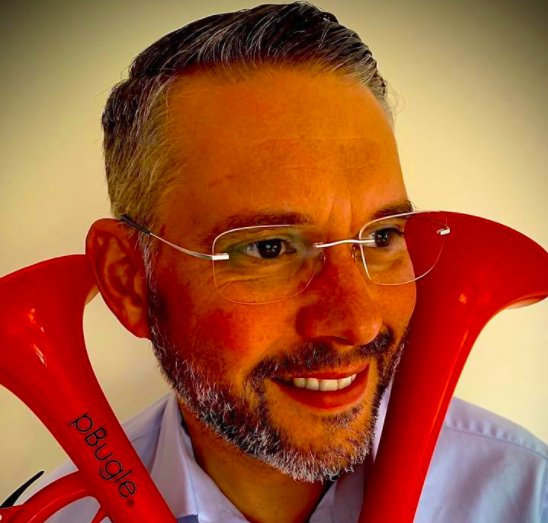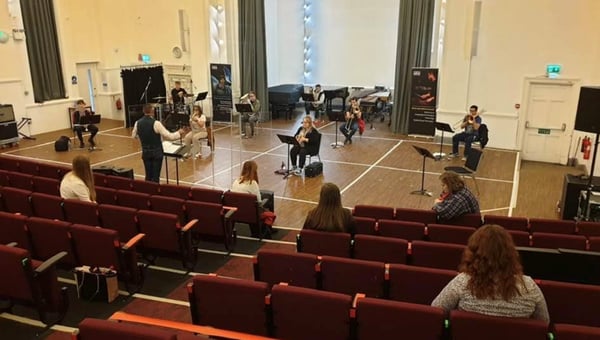Covid-19 and music in higher education - a blessing in disguise?
November 20th, 2020
2 min read
By Rich Harvey

The past few months have seen the world of music turned on its head, and higher education has not escaped the wrath of COVID-19. Back in March, a week before the announcement of the first UK lockdown, the University of Salford took the decision to close the campus, send students home and finish the academic year off via the wonders of Teams and Zoom… other tech companies enjoying rocketing share prices are available.
| Unlike many other institutions, Salford also made the decision to get back to as much face-to-face teaching as possible by the end of September, and following several months of writing risk assessments and awaiting Government guidance, (which seemed to be largely based on the belief of non-musician MPs that, when played, brass and woodwind instruments hose down everything within a 50m radius with virus-laden bodily fluids), the green light was given to start a variety of small ensembles, performance and conducting classes, using the well-proportioned Peel Hall. (It’s ironic that the most COVID secure music venue on the entire New Adelphi and Peel Park campus was built in 1896!) | 
|
Having to step back from the full brass and wind bands to accommodate the new Coronavirus protocols, we have developed a new small ensemble programme, focussing on music such as the Holst and Vaughan Williams suites, Mozart and Richard Strauss serenades and new works written especially for the ‘new norm’. One such piece, ‘Storm Cone’, by Lucy Pankhurst, is due to be recorded by the all-new Peel Brass Ensemble at the end of November, and we are extremely proud that we are still able to offer our students meaningful, challenging and fulfilling musical opportunities, despite being in the midst of a global crisis.

We also pride ourselves on the fact that every student has the opportunity to study conducting from their first year, and we are running a very successful module which sees the student conductors having around 45 minutes each week with two pianists. They are currently working hard on ‘The Planets’ suite, which was originally written for two pianos by the composer prior to the creation of the orchestral score. The performance classes are running relatively unscathed, and they involve the students working closely with an accompanist under the watchful eyes of their socially-distanced contemporaries; their first solo recitals are scheduled to take place at the beginning of December, albeit behind closed doors.
COVID-19 has made us all re-evaluate much of what we do, and in many ways this has been a positive, perhaps long-overdue experience; a chance to take a step back and look at what we are doing, and ask; “is this relevant to music in the Twenty-First Century?” The University of Salford’s degree programmes always have and always will focus heavily on future employability, and it is widely accepted that future pandemics are highly likely; one prediction is that we can realistically expect one every decade. We want to give the students the tools they need to flourish as musicians throughout their lives, so rather than shut up shop, hunker down and wait for the storm to blow over, the staff and students at the University of Salford have pulled on their wellies and raincoats and headed out into the deluge – after all, skin is waterproof.
Richard Harvey
Lecturer in Music at the University of Salford
Education Ambassador for Warwick Music Group
Founding Owner of Blast Off Brass
Richard Harvey MMus BMus(Hons) FRSM AMusTCL was born in Slough in 1973 and began learning the trombone at the age of eleven. Leaving school at sixteen, he joined the Royal Marines Band Service and studied under the renowned orchestral trombonist Albert Thompson. During his time under training Richard won the prestigious Cassel Prize – an annual instrumental competition, and was subsequently awarded a silver medal by the Worshipful Company of Musicians.
In 1994 he was drafted to the band onboard Her Majesty’s Yacht Britannia and spent the next three years travelling extensively around the world, performing to world leaders such as Bill Clinton and Nelson Mandela, as well as Her Majesty The Queen and other members of the Royal Family. Richard began conducting in earnest in 2003, and after completing the year-long Bandmasters’ Course at the Royal Marines School of Music, he enjoyed tenures as the conductor of the Warsash Community Band and Southampton Concert Wind Band – an ensemble consisting of over fifty instrumentalists – and during his time with them he led the band on a very successful tour of Bavaria.
In 2007 Richard was selected for commission, promoted Captain Royal Marines and appointed a Director of Music, and over the next six years he ran three RM bands, took a year’s sabbatical to study for his Master’s degree at the Royal Northern College of Music and served on a six-month operational tour to Afghanistan as the Adjutant of the United Kingdom Medical Group – a challenging yet rewarding experience. In 2012 Richard became the first member of Her Majesty’s Royal Marines to be admitted a Fellow of the Royal Schools of Music before retiring from the Service after a full military career in 2013.
In 2015 Richard was appointed Bandmaster of the prestigious and historic Royal Hospital School in Suffolk; only the sixth incumbent of the role since 1906, and over the next three years was responsible for running the concert band, parade band, brass ensemble, orchestra and big band; the highlight of which included a performance for HM The Queen at Newmarket.
In September 2019 Richard took up his current position as Lecturer in Classical Performance and Conducting at the University of Salford, where his duties include conducting the famous university brass band. In February 2020 Richard led the band to victory at the UniBrass contest, competing against prestigious institutions such as the Royal Northern College of Music. Richard is also the founding owner of Blast Off Brass; a workshop-based initiative to introduce brass playing to primary school pupils using the revolutionary pBuzz instruments, and in September 2020 he was incredibly proud to assume the role of Education Ambassador for Warwick Music Group. Richard said: “I have worked alongside WMG on various projects over the last five years or so, and have always been impressed by their innovative approach to music education. I am a fan of the pBuzz and use it to great effect in my workshops, and I am looking forward to incorporating the new pBugle into my sessions. I am incredibly excited to have been given this new role, and I am keen to get involved in as many projects with them as I can.”